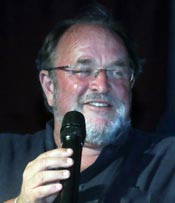Living a life of adventure while bringing life to history
William Dalrymple, celebrated historian, art historian, curator and broadcaster, has had an extraordinary adventure of a life. He set out to the East in search of archaeological mysteries and was to make it his home, though not digging in Iraq as he intended but pursuing India’s mosaic history.
Here for the Ceylon Literary Festival which concluded on Monday, he could relate tales aplenty- of tracing the source of the sacred Ganges, celebrating a hippy 19th birthday in a Vijayanagar temple in Hampi and trekking up the shadows of the Himalayas.

William Dalrymple
The author of ten books, all of them literary prize winners, Dalrymple’s field of interest is not limited to the hill and sea-bound India, he also explores history and art and religion in Afghanistan, the Middle East and China. He writes travel (often compared to Bruce Chatwin, of ‘In Patagonia’ fame) as well as history of an enjoyable, delectable kind.
Born to a Scottish baronet of long lineage (he is third cousin to Britain’s Queen Camilla), his dream was to go in search of Mesopotamia. But when Saddam Hussein cancelled his visa (decreeing the British School of Archaeology in Baghdad a ‘nest of British spies’) he winged to India with a friend.
The land would claim him and he started delving into its colourful past.
William is as proper a historian as you can find (a Visiting Fellow at Oxford and Honorary Fellow of the Bodleian Library) but he is outside the circuit of university dons and this helps his books to be as enjoyable reading as much as the fruit of ‘rigorous, scrupulous, research- deeply scholarly’.
“There’s a very crude dichotomy in the minds of people between popular history which has characterised incidents and stories, and academic history which is often dry as dust and is dryly analytical.” Dalrymple’s mission is to bridge that gulf.
His mentor in this regard is the great Steven Runciman, best known for ‘A History of the Crusades’ – “a superb sketcher of character and teller of story”.
Dalrymple’s travel books like ‘From the Holy Mountain’ took him to the Byzantine world (billed “an elegy to the slowly dying civilisation of Eastern Christianity and the peoples that have kept its flame alive”) to ‘Xanadu’ in Kublai Khan’s Mongolia.
The Company Quartet – the four books tracing the history of the infamous British East India Company are what he considers his seminal work. They would be his biggest contribution on the shelves “when I get run over by a truck or fall under a train,” he guffaws.
Asked what is his favourite out of a corpus that took so long to crystallize (the quartet alone took 20 years) William says it is White Mughals, ‘at the heart of which is a love story’ – a romance between a Hyderabadi Persian princess, and a British diplomat James Achilles Kirkpatrick who “comes up double edged- working against the East India Company for the Hyderabadis, and converts to Islam”.
One of the major fascinations is religion in India, explored in the book Nine Lives. He is an expert in Hinduism, Buddhism, Jainism and Early Christianity but what touches him most are not these. He is endlessly charmed by the ‘small sectarian and regional groups’ like, “the Bauls in Bengal who follow the way of the road as singing minstrels, or the Jains in Karnataka who go on this extraordinary ascetic path where they starve themselves to death, or the Buddhist monks of Dhammasala, the Pabuji Ki Phad minstrels in Rajasthan who follow the tradition of Pabhuji- the god of shepherds and cowherds…”
Another of his great contributions to the written word is India’s Jaipur Literature Festival co-founded with Namita Gokhale and Sanjoy Roy. He handles the ‘non-fiction and the international programming’ of what is billed as the ‘biggest literary festival in the world’ today.
With a half a million turnout this year, the festival inspired some 300 to 400 literature festivals to mushroom across South Asia. The reason the region is so partial says Dalrymple is that it has always had a tradition of performed art from the Mahabharata and the Ramayana, and literature here is not just “a private thing- not reading the book on your own on a sofa”.
“Every big court in India started in the morning with recitation of poetry; and there were court poets-… so it’s very strong in the South Asian psyche.”
His next book is The Golden Road, ‘on the diffusion of Indian culture’ and Sri Lanka is to play a star role. The book he says took him to “Cambodia, Java, Sicily and South India” in search of spectres left of the land of Bharat.
He is glad to be in Sri Lanka as a ‘punter’ rather than a war journalist which he once was and is happy the country is ‘peaceful, calm, charming and lovely’ again. He adds with a twinkle, “I am determined to find a way to spend more time in this island…”
Searching for an ideal partner? Find your soul mate on Hitad.lk, Sri Lanka's favourite marriage proposals page. With Hitad.lk matrimonial advertisements you have access to thousands of ads from potential suitors who are looking for someone just like you.


